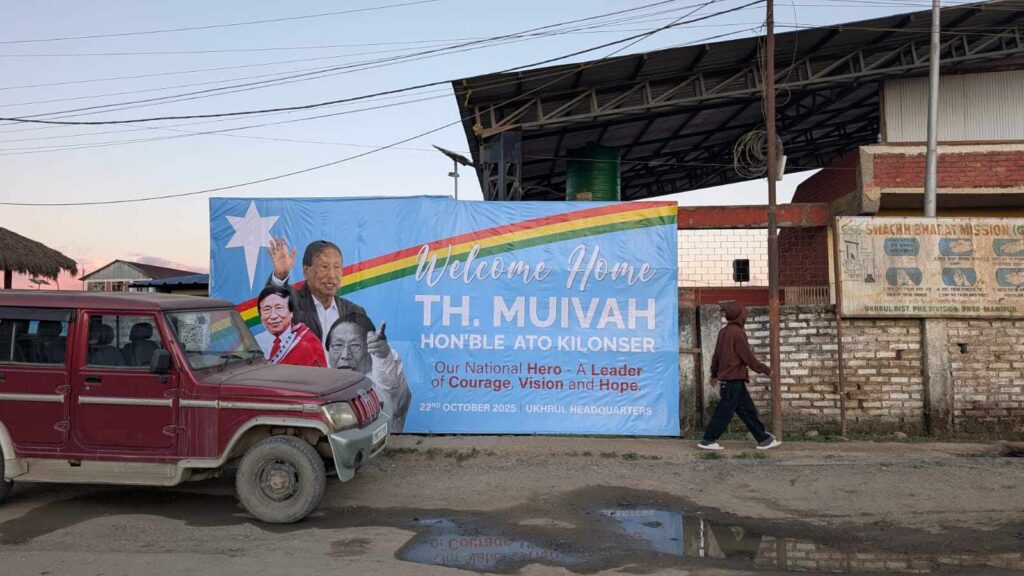More than five decades after he first went underground to join the fight for Naga autonomy, Thuingaleng Muivah, general secretary of the Isak-Muivah faction of the National Socialist Council of Nagaland (NSCN), now 91 years old, will have a ‘homecoming’ on Wednesday.
His village Somdal and Manipur’s Ukhrul district, where it is located, are preparing to welcome him back for the first time since he joined the Naga movement in the mid-1960s, apart from a brief and secret visit that reportedly took place in 1973.
The now-aged Muivah, a Tangkhul Naga, is the last surviving founding leader of the NSCN. That puts him at the helm of talks with the Indian government for a solution to the longstanding Naga political problem since the NSCN (I-M) entered a ceasefire agreement in 1997, and, for all intents and purposes, makes him the face of one of South Asia’s oldest insurgencies.
On Wednesday, he is scheduled to arrive by chopper at the Ukhrul district headquarters in the morning from Dimapur, where he currently lives, after which he will participate in a public meeting.
“The headmen of all Tangkhul villages will attend this, as well as representatives of different Naga organisations like the Naga Students’ Federation, United Naga Council, Naga Hoho and Naga Women’s Union. After that, he will travel by chopper to Somdal, where he will spend a week,” said R S Jollyson, vice-president of the Tangkhul Naga Long, the apex body of the Tangkhul community.
On October 29, he is scheduled to leave his village and attend a public meeting at the district headquarters of Senapati, another Naga-majority district in Manipur.
After decades of insurgency and lobbying for the cause of Naga sovereignty that has seen Muivah spend time in, among other places, China, Myanmar, Thailand and the Netherlands, his return to his home ground is set to be an emotionally charged event.
“From a Naga perspective, we are very much rooted in our villages, which researchers call ‘tiny republics’. We are connected to our land and our village. Even if you have lived far away for very long, your village pulls you back. Our Naga movement itself is based on the issue of land. As a person, his (Muivah’s) roots and identity emanate from his village. It is an affirmation of his identity and his return has been a long unfulfilled wish,” said Thingreiphi Lungahrwo, president of the Tangkhul Shanao Long, the apex Tangkhul women’s body.
While that was “the personal significance of this moment”, Lungahrwo added: “As the leader of the Naga movement, his presence here will energize the people here who all look up to him.”
Wednesday will be the second time in recent times that Muivah has tried returning to his village. In 2010, however, his visit to Ukhrul and Somdal was thwarted when the Manipur government, then led by the Congress’s Okram Ibobi Singh, refused to allow him entry.
This had escalated into another violent chapter in Manipur’s history, with at least two persons killed and over 80 injured at Mao Gate on the Nagaland-Manipur border when police opened fire on people protesting against the denial of entry to Muivah. Ultimately, he was asked by the Centre to put off the visit till the situation improved.
The Naga movement has always had a fraught relationship with Muivah’s home state Manipur because the agitation’s idea of a ‘unified Naga homeland’ includes the stretches of land in Manipur inhabited by Nagas, who are the state’s second largest ethnic group.
This time, with Manipur caught in a separate conflict, the Naga talks with the Centre in a limbo since the signing of the Framework Agreement in 2015, and Muivah’s own advanced age, there has not been resistance to the proposed visit so far.
Academic Yuimirin Kapai said that Muivah is returning home at “the lowest ebb of the underground movement”. “Even more than in Nagaland, the Nagas in Manipur had long hoped for a political settlement which would give them more autonomous administration of their own territories. But that hope has been fading as the years pass by… So there is hope among political workers that Muivah’s visit will enthuse people and help bridge the gaps that have developed between them and political workers,” Kapai said.
As part of the preparations, Lungahrwo said Ukhrul has planned a special ceremony on October 27. “On that night, Somdel village will light a torch, which we call charmei, and every Tangkhul village will light a bonfire as a mark of solidarity. It will be a symbol of our closeness and the warmth of Muivah’s homecoming,” she said.

